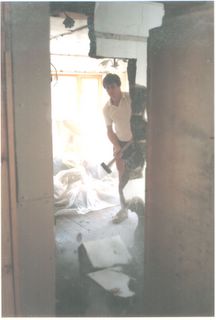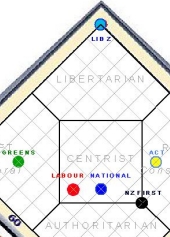Joe, you say of "the 'blog' phenomena... I view them as the opposite of the capital accumulation idea. This isn't to say they aren't worth doing, or they aren't effective. They certainly can be effective in terms of activism. But they violate the principle of not consuming all your time in maintenance."
I don't agree. I have to say, I think this shows a fundamental misconception of the nature of blogs. It really depends on the blog and what you wish to do with it.
First of all, if you have a blog and you're doing it properly, a blog takes no more work than it takes Tibor, for example, to write a piece a day - and in fact the process of regularly writing a piece a day helps automatise both the skill and the habit of writing. The more you write, the better at it you become; blogs give you a strong incentive to get better, and to write more. Producing a daily article or three becomes easier the more you do it.
So blogs help produce writing that would otherwise not exist.
But you're not really accumulating 'capital,' you say? Well, you are if you're doing it right, say I. Over time, as you write pieces and commentary on daily events, you build up a valuable resource that can be and is drawn on for later pieces. No point in saying something anew when you can simply quote what you said on a similar topic previously. And the more you write, the more you can quote.
In fact, the more you write, the more 'capital' you have to 'categorise' and 'tag.' Once you begin 'tagging' your writing by subject heading, and even collecting together all your own writing across the web on the basis of its subject heading, it doesn't take long before you build up a nest-egg of pieces on a range of topics.
For instance, the Categories that collect the writing from my own blog 'Not PC' now boast 108 posts on Architecture and Urban Design, 15 on Common Law, 103 on Property Rights, 63 on Education and 107 on or related to Economics -- and even 136 pieces on or related to Objectivism! -- and all produced since I began the blog last April as a way of intellectual activism ideally suited to the Objectivist activist in New Zealand: the communication of passionate art and rational ideas to those who desperately need them.
So there's an enormous amount of 'capital' right there already, right?
And once categorised and collected,whose to say what these pieces might be used for later? Even on the net as they are already they're a wonderful example of 'capital accumulation' with nary any maintenance whatever, there to be used and referred to regularly. But this is 'capital' that can be invested in future projects, for even more 'capital accumulation.'
The collection of pieces on 'Cue Card Libertarianism' for instance, begun by Lindsay Perigo back in 1993 and progressively updated at my blog, cry out to be collected in book form once the updating is completed, perhaps supplemented with any one of the 257 pieces I've written since April on the subject of or related to Libertarianism.
So I just don't understand this idea that blogs are somehow profligate wastes of time and energy. If you're doing it right, nothing could be further from the truth.
To say that writing and producing blogs posts is inefficacious as a form of activism or of 'capital accumulation' is like saying Rand's own articles for the The Objectivist and the Objectivist Newsletter were inefficacious, since there was no capital accumulation, and the value of the effort diminished over time. This on its face wold be ludicrous, and would ignore the enormous pay-off from her investment, not just in the greatly expanded clarity of her own thinking in writing these many wonderful pieces, but also, for example, in providing the material for the many collections of these non-fiction essay that we all now enjoy.
Tibor's own articles provide another example of good capital investment: many of Tibor's best articles can be found collected and lightly edited in many of his own books -- his investment in writing his regular articles pays off by producing material and ideas he can then publish in book form.
"How about maintenance?" you say. "[Blogs] certainly can be effective in terms of activism. But they violate the principle of not consuming all your time in maintenance."
As I said above, if you do it right this is just not so. And you yourself "admit the [RoR] site requires a lot of maintenance work." A blog, if you're doing it right, requires little more maintenance than writing something for the front page of SOLO or RoR. And I doubt that you'd call that a waste of time.
Wednesday, December 14, 2005
Thursday, September 29, 2005
Pop star or porn star? Guess right and you get fifty points. Guess wrong and, well, you still haven't really lost now have you.
A great game for a Friday night. Linked game here.

A great game for a Friday night. Linked game here.


Monday, September 26, 2005
Monday, July 25, 2005
Friday, July 01, 2005
Tuesday, June 28, 2005
Photo by Brett Holverstott of Stuart Mark Feldman's sculpture group, The Future In Our Hands. Review of the landmark sculpture by Michael Newberry here. "It is a brilliant achievement," says Newberry, "not only in the sense that it is a realization of the artist's ecstatic vision, but it also holds the exalted place of being an innovative work in the history of art." 



Monday, June 27, 2005
Friday, June 24, 2005
Sunday, June 19, 2005
Tuesday, May 24, 2005
Thursday, April 21, 2005
RMA is permissive? Yeah, right.
"Property developers could face more hurdles in getting large new projects approved after a Supreme Court decision this week," says Resource Management Act (RMA) specialist Richard Brabant this morning.
Like they need more hurdles, right? And who pays when every new hurdle adds costs? You can answer that one yourself, can't you.
According to the RMA's cheerleaders, the RMA is en example of "permissive legislation." That's what ACT's Ken Shirley said at the time. Further, the RMA does not allow anti-competitive behaviour said the cheerleaders.
Well, tell that to Josephine Grierson and the tenants and customers at the Fox outlet shopping centre in Northcote; it is the Resource Consent for this project that the Supreme Court has turned down. The Resource Consent was in the Supreme Court because shopping mall giant Westfield objected to another shopping centre down the road from their own.
The RMA is permissive. Really?
And it prohibits anti-competitive behaviour. Yeah, right.
Like they need more hurdles, right? And who pays when every new hurdle adds costs? You can answer that one yourself, can't you.
According to the RMA's cheerleaders, the RMA is en example of "permissive legislation." That's what ACT's Ken Shirley said at the time. Further, the RMA does not allow anti-competitive behaviour said the cheerleaders.
Well, tell that to Josephine Grierson and the tenants and customers at the Fox outlet shopping centre in Northcote; it is the Resource Consent for this project that the Supreme Court has turned down. The Resource Consent was in the Supreme Court because shopping mall giant Westfield objected to another shopping centre down the road from their own.
The RMA is permissive. Really?
And it prohibits anti-competitive behaviour. Yeah, right.
Subscribe to:
Comments (Atom)








